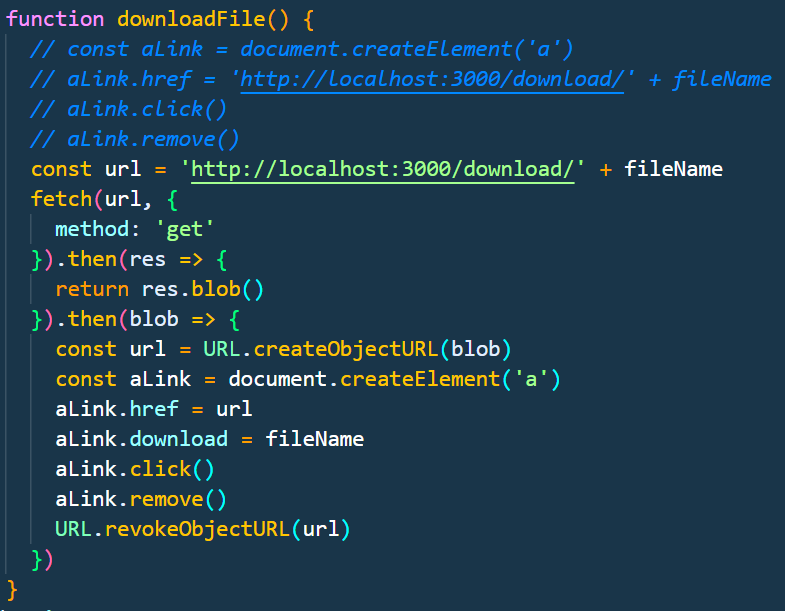文件上传下载
Date:
文件上传、下载、分片上传下载的实现思路
目录
一、文件上传
1 简单小文件
前端
- input file 标签
- 使用FormData对象, append
- 发起post请求
后端
- 解析请求体,拿到文件和表单信息
- 校验文件类型、大小,保存文件
- 返回响应
2 分片上传
分片上传的简化流程:
- 文件分块:前端将文件分为多个chunk, 每个chunk有个MD5,整个文件有个MD5
- 文件信息协商:前端先发个请求,把所有的相关信息(文件MD5、Chunk-MD5、chunk个数等等)发给后端,后端返回需要上传的chunk-MD5列表, 上传过的chunk,则不需要再上传(服务端判断)
- 上传chunk:前端上传未上传的chunk(并行/串行上传)(chunk上传接口)
- 合并文件:最终后端所有chunk上传完毕,合并文件(文件合并接口)
二、文件下载
0 简单的小文件:
场景:前端展示某个文件,点击下载,浏览器发一个点击的item的信息给后端,后端收到后,返回一个文件流, 在响应头中加上
Content-Disposition: attachment; filename="xxx",浏览器收到后,即触发下载。
这种场景下,前端不需要做啥处理,全仰仗浏览器。

1 大文件,分块下载
从Minio上拉文件时,就是分块的,会创建一个.part文件,最终所有分块的文件会合并成一个文件。
前后端的文件下载也一样,基于Http-Range请求,前端请求Chunk,后端响应文件块,最后在前端把所有Chunk合并成一个文件,触发浏览器下载。
这个之前在网格编辑器干过,前端分块下载,通过Blob对象,把所有Chunk合并成一个文件,再触发浏览器下载,这种相当于把分块在内存中合并了,如果是GB的东西,这种做法就不合适了。
当时写的旧代码 FileDownloader.ts ,后端还比较简单,python open file之后,可以直接根据range请求,返回文件块。
分片下载的简化流程:
- 文件Size分块:获取文件大小,计算chunk个数,初始化chunk数组,确定并发请求数
- 下载阶段:并发下载chunk,限流并行下载,每个thread专门负责
nowChunkID + this.threadNum的这些chunck,一个个下载,这个thread任务结束了会标记fulfilled - 合并阶段:所有thread任务结束,合并chunk,
URL.createObjectURL,触发浏览器下载
import axios from "axios"
/**
* Example:
* const fileDownloader = new FileDownloader({
* url: 'http.....',
* fileName: 'res.zip',
* chunkSize: 1024 * 1024 * 128,
* cb: (done: boolean, current: number, total: number) => {
* if (done) {
* console.log('Download complete!')
* return;
* }
* console.log(`Downloading... ${Math.round(current / total * 100)}%`)
* }
* })
* fileDownloader.download()
*/
export default class FileDownloader {
url: string
fileName: string
fileSize: number
chunks: Array<unknown>
chunkSize: number
chunkNum: number
currentChunk: number
downloadedSize: number
abortController: AbortController
done: boolean
err: boolean
callback: Function | null
intervalID: number | null
threadNum: number
fullfilledFlags: Array<boolean>
constructor({ url, fileName, chunkSize = 64 * 1024 * 1024, threadNum = 4, cb }: {
url: string,
fileName: string,
chunkSize?: number,
threadNum?: number,
cb?: Function
}) {
this.url = url
this.done = false
this.err = false
this.fileName = fileName
this.fileSize = 0
this.chunks = []
this.chunkNum = 0
this.chunkSize = chunkSize
this.currentChunk = 0
this.downloadedSize = 0
this.abortController = new AbortController()
this.callback = cb ? cb : null;
this.intervalID = null
this.threadNum = threadNum
this.fullfilledFlags = []
}
getNextChunckID(nowChunkID: number) {
let nextID = nowChunkID + this.threadNum
nextID >= this.chunkNum && (nextID = -1)
return nextID
}
async download() {
console.time("download")
await this.prepare()
this.intervalID = window.setInterval(async () => {
this.callback && this.callback(!(this.downloadedSize < this.fileSize), this.downloadedSize, this.fileSize)
}, 1000)
for (let i = 0; i < this.threadNum && i < this.chunkNum; i++) {
this.downloadChunk(i)
}
}
async prepare() {
try {
const res = await axios.head(this.url, { signal: this.abortController.signal })
this.fileSize = parseInt(res.headers['content-length'])
this.chunkNum = Math.ceil(this.fileSize / this.chunkSize)
this.chunks = new Array<unknown>(this.chunkNum)
this.currentChunk = 0
this.fullfilledFlags = Array.from({ length: Math.min(this.threadNum, this.chunkNum) }, _ => false)
} catch (e) {
this.err = true
this.destroy()
console.error("FileDownloader Prepare Error:" + e)
}
}
async downloadChunk(chunkIndex: number) {
try {
if (this.err) return
const start = chunkIndex * this.chunkSize
const end = Math.min(start + this.chunkSize - 1, this.fileSize - 1);
const res = await axios.get(this.url, {
headers: { "Range": `bytes=${start}-${end}` },
responseType: "blob",
signal: this.abortController.signal
})
if (res.status !== 206) throw 'HTTP-Request Error'
const blob = new Blob([res.data])
this.chunks[chunkIndex] = blob
this.downloadedSize += blob.size
const nextChunkID = this.getNextChunckID(chunkIndex)
if (nextChunkID != -1) {
this.downloadChunk(nextChunkID)
} else {
const threadID = chunkIndex % this.threadNum // this thread done.
this.fullfilledFlags[threadID] = true
// Merge chuncks when all thread done.
this.fullfilledFlags.every(flag => flag === true) && this.mergeChunks()
}
} catch (e) {
this.err = true
this.destroy()
console.error("FileDownloader DownloadChunk Error:" + e)
}
}
mergeChunks() {
if (this.downloadedSize !== this.fileSize) throw "File size mismatch"
if (this.err) return
this.intervalID && clearInterval(this.intervalID)
const blob = new Blob(this.chunks as BlobPart[]) // Blob合并
const url = URL.createObjectURL(blob)
const link = document.createElement('a')
link.href = url
link.download = this.fileName
link.click()
this.done = true
setTimeout(() => {
console.timeEnd("download")
this.callback && this.callback(true, this.downloadedSize, this.fileSize) // for progress
link.remove()
URL.revokeObjectURL(url)
this.destroy()
})
}
destroy() {
this.fileName = ''
this.fileSize = 0
this.chunks = []
this.chunkNum = 0
this.currentChunk = 0
this.downloadedSize = 0
this.intervalID && clearInterval(this.intervalID)
this.abortController.abort()
}
}
